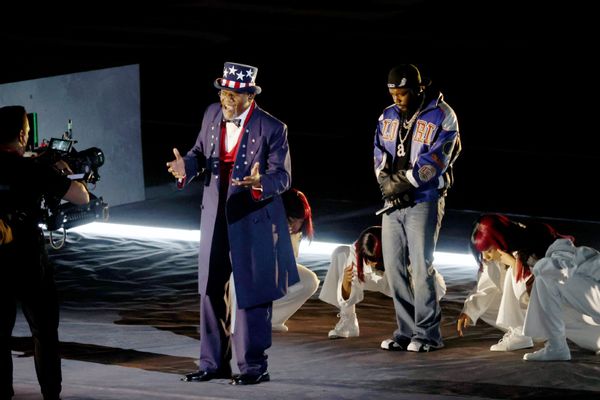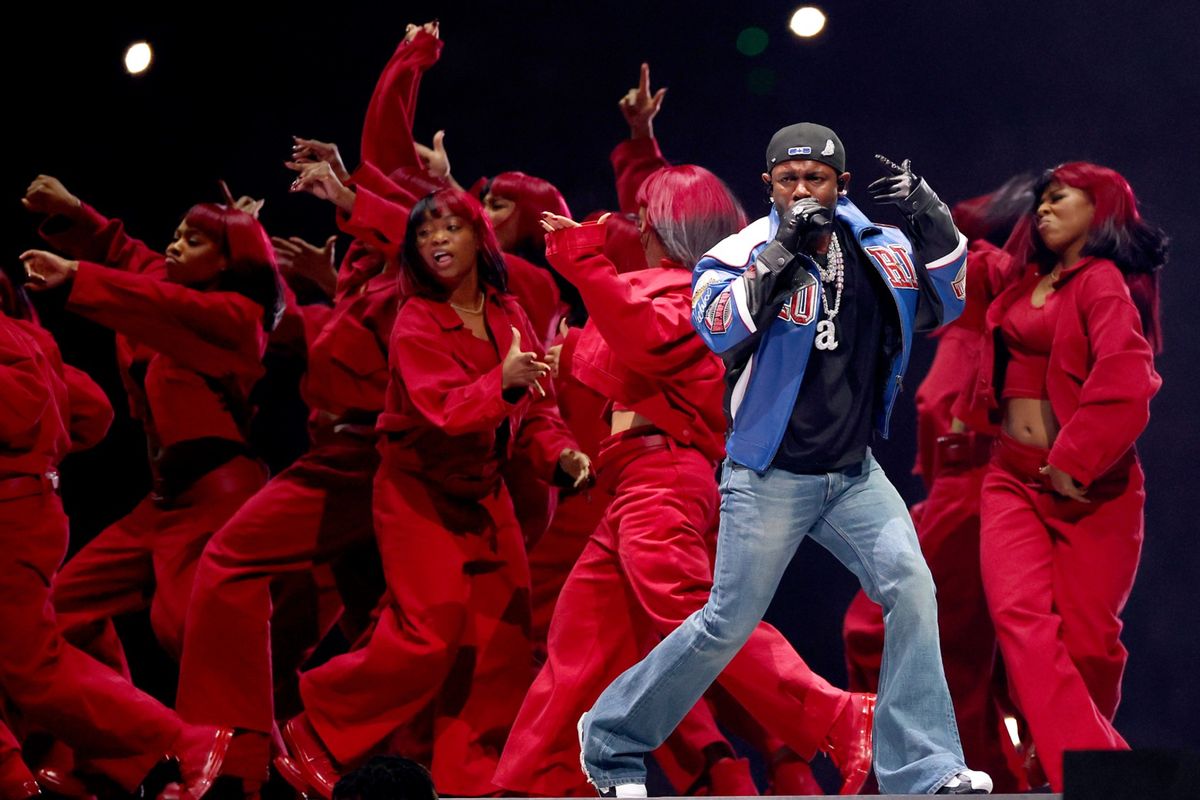The spirit of resilience was in the air at Super Bowl LIX, and I don’t just mean from the Kansas City Chiefs, who put up a decent fight against the Philadelphia Eagles, despite being met with deafening boos from Eagles fans from the moment they stepped onto the field at New Orleans’ Caesars Superdome. Rather, strength, unity and resilience were some of the night’s biggest buzzwords, appearing in pre-game programming and those famous multi-million dollar ad spots during the big event. The pre-game show opened with a tribute to New Orleans, which is still reeling from the New Year's Day terrorist attack that killed 14 people and injured 57 others in the city’s French Quarter.
With Donald Trump returning to office and the Big Game turning into a vacuum of trivial balderdash, there’s no better recent example of America’s massive cultural stalemate than Super Bowl LIX.
In a segment recorded a few days before the game, former Super Bowl champs Tom Brady and Michael Strahan strode along Bourbon Street, telling viewers that the city’s spirit would not be shattered. “The resilience of New Orleans is matched by the resolve of our country,” Brady said. “When tragedy strikes, we don't break — we come together, rise above and never let evil win.” Then, Lady Gaga appeared like an angel in white, seated at a piano to sing her “Top Gun: Maverick” hit “Hold My Hand” as a tribute to both New Orleans and Los Angeles, as both cities navigate their own harrowing catastrophes. Soon after, Brad Pitt introduced the game with a more word salad-y monologue that featured a compilation of historical moments of American perseverance. “Union is at the heart of this glorious, chaotic, exasperating experiment that is us,” Pitt said over clips of civil rights marches and NASA launches. Yeah, whatever that means.
Pitt’s introduction was the kind of messaging that looks good and sounds nice — especially after a few beers, when the chatter of a Super Bowl party and too much buffalo dip are lulling you to sleep before the game has even started. But when you examine it closely, it falls apart under the weight of scrutiny. The NFL-sponsored spot touted togetherness using the metaphor of the football huddle, when individuals come together to plan their best path to a win, and ostensibly, a better future. It was all suggestion and no specificity, letting the viewer infer whatever they wanted from the clip.
In retrospect, the spot was so safe that it was the perfect omen for how overwhelmingly bland this year’s Super Bowl turned out. Until the very end of the third quarter, the Chiefs didn’t have a single point on the board. But beyond the game itself, there was none of the flash or flair that we’re used to seeing from one of the biggest nights in American sports and international television. The ads were dull, Taylor Swift didn’t get the chance to blow any kisses to her losing lover and even Kendrick Lamar’s highly anticipated halftime show left some spectacle to be desired. (Though, it’s hard to argue that Lamar’s performance wasn’t the highlight of a tedious night.) The monotony of the entertainment onscreen was at odds with the events happening outside the stadium, felt throughout the country as political and social chaos continues to loom large. With Donald Trump returning to office and the Big Game turning into a vacuum of trivial balderdash, there’s no better recent example of America’s massive cultural stalemate than Super Bowl LIX.
Just a few days before the game’s Feb. 9 kickoff, the White House confirmed to CNN that President Trump would be the first sitting president to attend a Super Bowl, because if there’s one thing Trump loves more than sowing discord among Americans, it’s attention. Cuts to the president, tucked away in his secure box, provided a few jump scares throughout the night, sometimes even livening up the moment. But his attendance felt more like goading than a desire to celebrate American athletes. He is pervasive and inescapable, and despite some viewers arguing that sports and politics should remain separate, the two are inherently connected, something that Trump’s presence only further confirmed.
Want a daily wrap-up of all the news and commentary Salon has to offer? Subscribe to our morning newsletter, Crash Course.
For a city that was already expanding its security in the wake of a terror attack, Trump’s attendance meant that intense measures would need to be beefed up even further. The increased safety resulted in small New Orleans businesses not seeing the boost in business they hoped for as ticketholders and celebrities flocked to the city ahead of Sunday’s game. In a time when local economies could desperately use a shot in the arm, it was tough to see such a lukewarm approach to tourism for a city that has endured so much suffering.
Given that Trump’s decision to attend the game meant that further safeguards had to be installed, thus impacting tourism even more, perhaps it’s just ultimate cosmic irony that the Chiefs lagged for the entire game. In an interview with Fox News before kickoff, Trump predicted that the Chiefs would take home the Lombardi trophy given quarterback Patrick Mahomes’ Super Bowl track record. But it was Mahomes’ wife Brittany with whom Trump seemed most fascinated. “She’s a Trump fan, she’s a MAGA fan, so I happen to love her,” he said. After weeks of having to endure Trump’s attempts to roll back civil rights and DEI programs, knowing that he was present as his preferred team was losing made a relatively boring game with little competition that much more gratifying.
Kendrick Lamar’s halftime performance helped on that front, too. Lamar already had a banner month, having just won multiple Grammys for his Drake diss track “Not Like Us.” Taking the biggest stage in music a week later was merely a victory lap, one that brought Super Bowl LIX out of the doldrums — at least for 12 minutes. Lamar’s show didn’t have quite the same spectacle of Rihanna’s floating platforms (and pregnancy reveal) or the nostalgia of Usher rollerskating to his biggest hits. But what Lamar’s performance lacked in all-out pageantry, it made up for in precision.
 (L-R) Samuel Jackson and Kendrick Lamar are seen onstage during Apple Music Super Bowl LIX Halftime Show at Caesars Superdome on February 09, 2025 in New Orleans, Louisiana. (Chris Graythen/Getty Images)The performance began with Samuel L. Jackson making a cameo dressed as Uncle Sam, a subtle way to irritate both Trump and any other racist viewers watching who have been newly emboldened by the president’s rhetoric. It was also a chance for Lamar to make incisive commentary within his performance without ruffling the feathers of advertisers or the NFL. Between songs, the camera cut to Jackson, who took on the voice of white America and parroted things that close-minded critics might say about the first solo rap artist to perform at the Super Bowl. “No, no, no, no!” Jackson began at one interlude. “Too loud, too reckless, too ghetto! Mr. Lamar, do you really know how to play the game?”
(L-R) Samuel Jackson and Kendrick Lamar are seen onstage during Apple Music Super Bowl LIX Halftime Show at Caesars Superdome on February 09, 2025 in New Orleans, Louisiana. (Chris Graythen/Getty Images)The performance began with Samuel L. Jackson making a cameo dressed as Uncle Sam, a subtle way to irritate both Trump and any other racist viewers watching who have been newly emboldened by the president’s rhetoric. It was also a chance for Lamar to make incisive commentary within his performance without ruffling the feathers of advertisers or the NFL. Between songs, the camera cut to Jackson, who took on the voice of white America and parroted things that close-minded critics might say about the first solo rap artist to perform at the Super Bowl. “No, no, no, no!” Jackson began at one interlude. “Too loud, too reckless, too ghetto! Mr. Lamar, do you really know how to play the game?”
It was a shrewd way for Lamar to comment on the dissonance of being a Black artist performing directly in the gaze of someone like Trump. Other elements seemed to nod to this as well, like one section of the show where Lamar’s dancers were dressed in red, white and blue and standing close enough to recall the image of the American flag, without ever coming together to complete the picture. These moments cleverly implied the disparity between the white figures who retain power in America — even after being voted out of office — and Black artists whose work is denigrated and judged by those powerful figures and the people who share their values.
Super Bowl Sunday used to be a day where culture was made. Now, it’s where culture is flattened into the most flavorless, insignificant iteration of itself possible.
But Lamar’s show made plenty of time for fun, shocking moments as well. At a certain point, I began to wonder if the lawsuit leveraged by Drake against Universal Music Group would impact Lamar’s ability to perform “Not Like Us” during the set. Lamar knew exactly how to build anticipation during the show, winking at the legal battle halfway through. “I want to perform their favorite song, but you know they love to sue,” Lamar joked in a call and response section with his dancers. After bringing out frequent collaborator SZA to perform “Luther” and “All the Stars,” Lamar launched into his now infamous diss, staring down the barrel of the camera lens and smiling before calling Drake out by name. Just like when Lamar scooped up an award for “Not Like Us” at the Grammys, he had the whole Super Bowl crowd singing along to his particularly pernicious barbs.
It was one of the most satisfying moments of the entire night, but that’s not a high bar, considering that there weren’t many other memorable moments to choose from. While Eagles fans are no doubt still tearing it up in the streets of Philadelphia this morning, the wide margin of points between the two competing teams made the game uninteresting to keep up with for those of us who are just casual watchers. Pair the game’s lackluster outcome with a spate of ads that touted AI technology or turned celebrities into terrifying CGI abominations of themselves, and the whole evening felt like a distant echo of what the Super Bowl once was.
With no competition in the game itself and no ads that would suggest our culture has anything more exciting to offer than sequels and regurgitated, live-action adaptations of hit animated movies, watching the Super Bowl felt like turning on the TV in the waiting room of purgatory. Super Bowl Sunday used to be a day where culture was made. Now, it’s where culture is flattened into the most flavorless, insignificant iteration of itself possible. That much was clear from the first year that ads — once as anticipated as the game itself — were uploaded online before they aired on television, but that doesn’t make the regression any less bleak. There are, of course, more pressing things happening in our country than sports pageantry and bite-size, 30-second doses of capitalism. But when one of the biggest television events of the year can’t even be a mind-numbing, five-hour distraction, perhaps it’s time to admit that one of the biggest symbols of American culture peaked a long time ago, and that there’s no way to properly enjoy it until we tend to all of that chaos happening outside of the arena first.



Shares